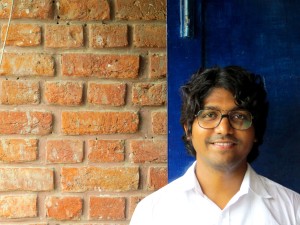My translation of two popular Telugu songs written by Guda Anjaiah ( from his collection of songs/ballads 'uuru manadiraa!'). Both the songs were written in the 70s and focus on 'sons' who had gone missing after joining various resistance movements: mostly ultra-left Naxalite groups, anti-caste, students' and peasant-workers' agitations. The first song 'Where could he be, my son?' ( 'ekkaDunnADO koDuku?' in Telugu) was written in 1972 and the second song, a kind of response to the first one, 'Ammaa..O Ammaa..' ( 'ammaa..O ammaa..' in Telugu) was written in 1976, when Anjaiah himself was in the Musheerabad Jail in Hyderabad, during the Emergency (a period during which over 450 activists, according to civil rights' groups, were killed in fake encounters across Andhra Pradesh, from Srikakulam to Telangana).
Where could he be, my son?
Don't know where he is, my son,
Don't know where he's wandering, my son,
Don't know if any kind mother has fed him a fistful of ganji*
Don't know if any father has given him shelter // Don't know where //
Son, Rajanna, you're young, I said,
We can't fight with the Dora**
We're poor, we're penniless
We can't stand against big, big people, I said,
He didn't listen to my pleading
He asked me to step aside // Don't know where //
Villages and wadas might be different, he said,
But the poor are one, their sorrows are the same
The greed of the rich is limitless, he said,
To unite the poor across villages, to prepare them for battle
He's goading them, they say,
And the police are pursuing him, they say. // Don't know where //
A couple of days ago, he was in the Mulugu jungles, they say
Before that he was in the hills of Guntur
He's spread into the Palvancha jungles, they say,
Look, in the jungles of Srikakulam, they say,
there's not an inch he hasn't traversed. // Don't know where //
He's a brother to the Harijans and Girijans, they say,
A saviour for the poor
And a crowbar driven into the heart of the rich
A scourge for exploiters, they say,
He's marching ahead for a just society. // Don't know where //
* ganji: watery rice gruel, mostly water in which rice is boiled.
** Dora: (pronounced 'dora'); upper caste landlord.
Ammaa.. O Ammaa..
Ammaa..O Ammaaa
don't grieve because your son
is not with you // Amma..O ammaa //
In the path of battle
there are mothers like you, mother,
They watch over me
like the eyelid guards the eye // Amma..O ammaa //
Tending to my wounds
applying pasaru* and bandages,
bringing me cold gatuka**,
feeding me with your hands,
O mother who sent me off to war ! // Amma..O ammaa //
Birds with chopped off wings
are lying here like beggars,
A parrot is trapped
in the talons of vultures
The vultures have to be chased away
and the parrot rescued // Amma..O ammaa //
When the enemy discovered my hideout
and surrounded the hut,
tightening the noose
lying in ambush,
mother village protected me
in the shade of her kongu+. // Amma..O ammaa //
Like the fish in water
I am among people,
To repay the debt to my motherland
I am in the battlefield
For tomorrow's dawn
I am pouring out my life. // Amma..O ammaa //
* pasaru: sap, or juice of certain leaves used as medicine.
** gatuka: (pronounced 'gaTuka' ); gruel made of cooked jowar, maize or other millets.
+ kongu: free end of the sari, the pallu.

